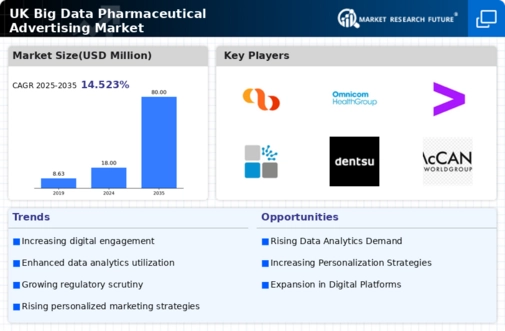Regulatory Changes and Compliance Needs
Regulatory changes in the pharmaceutical sector are a significant driver for the big data-pharmaceutical-advertising market. The UK government has implemented stringent regulations to ensure ethical advertising practices and patient safety. Compliance with these regulations requires pharmaceutical companies to adopt advanced data analytics solutions to monitor and evaluate their advertising strategies. The market for compliance-related software is expected to grow by 20% in the coming years, reflecting the increasing need for adherence to these regulations. By utilising big data, companies can ensure that their advertising campaigns are not only effective but also compliant with legal standards, thereby reducing the risk of penalties and enhancing their reputation in the market.
Emergence of Data-Driven Decision Making
The emergence of data-driven decision making is transforming the big data-pharmaceutical-advertising market. Pharmaceutical companies are increasingly relying on data analytics to inform their marketing strategies, leading to more informed and effective advertising campaigns. In the UK, the adoption of data-driven approaches is expected to rise by 40% over the next few years, as companies recognise the value of insights derived from big data. This shift allows for better targeting of advertising efforts, maximising return on investment. Furthermore, data-driven decision making enhances the ability to measure campaign effectiveness, enabling continuous improvement. As such, this trend is likely to play a crucial role in shaping the future of the big data-pharmaceutical-advertising market.
Growing Demand for Personalised Medicine
The increasing emphasis on personalised medicine is a pivotal driver for the big data-pharmaceutical-advertising market. As healthcare evolves, patients are seeking treatments tailored to their unique genetic profiles and health conditions. This shift necessitates the use of big data analytics to identify patient demographics and treatment efficacy. In the UK, the market for personalised medicine is projected to reach £2.5 billion by 2026, indicating a robust growth trajectory. Pharmaceutical companies are leveraging big data to enhance their advertising strategies, ensuring that they reach the right audience with the right message. This trend not only improves patient outcomes but also optimises marketing expenditures, making it a critical component of the big data-pharmaceutical-advertising market.
Increased Investment in Digital Marketing
The shift towards digital marketing is reshaping the landscape of the big data-pharmaceutical-advertising market. Pharmaceutical companies in the UK are increasingly allocating budgets towards digital channels, recognising the potential for higher engagement and conversion rates. It is estimated that digital advertising spending in the pharmaceutical sector will exceed £1 billion by 2025. This trend is driven by the need to reach tech-savvy consumers who prefer online platforms for health information. Big data analytics plays a crucial role in optimising these digital marketing efforts, allowing companies to analyse consumer behaviour and preferences. Consequently, the ability to effectively utilise digital marketing strategies is becoming essential for success in the big data-pharmaceutical-advertising market.
Advancements in Data Collection Technologies
Technological advancements in data collection are significantly influencing the big data-pharmaceutical-advertising market. The proliferation of wearable devices, mobile health applications, and electronic health records has led to an unprecedented volume of health-related data. In the UK, it is estimated that the healthcare data market will grow by 30% annually, driven by these innovations. This influx of data allows pharmaceutical companies to conduct more effective advertising campaigns, targeting specific patient populations with tailored messages. Furthermore, the integration of real-time data analytics enables companies to adjust their strategies promptly, enhancing the overall effectiveness of their marketing efforts. As a result, the ability to harness these technologies is becoming increasingly vital for success in the big data-pharmaceutical-advertising market.
















